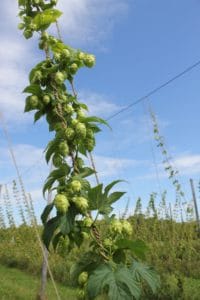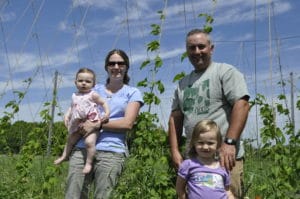Aroostook Hops: SARE Grant Results in Increased Yield
By implementing drip irrigation and mulching, a Maine hops farm significantly improves yields and net revenue.
Welcome to the Northeast SARE Spotlight!
SARE (Sustainable Agriculture Research and Education) offers grants to farmers, educators, universities and communities that are working to make agriculture more sustainable – economically, environmentally, and socially. Learn about whether a SARE grant would be a good fit for you.
Located in the heart of Maine’s potato production
To the passerby, the hops trellis rising from the ground at Krista Delahunty and Jason Johnston’s farm triggers a second glance if not a close inspection. Tucked within a county of potato fields, Aroostook Hops LLC is an island of uniqueness, welcoming back the production of hops to the Northeast. Hops, a climbing herbaceous perennial, were once commonplace in the Northeast until the 1800’s. Due to high humidity of the East, hops production largely migrated west where arid conditions limit the spread of pests and disease. Flash forward 200 years and with a growing interest in local microbreweries, hops production has returned east. As scientists and avid gardeners, Krista and Jason’s interest in producing hops began with their own homebrew. When they searched for hop rhizomes (rootstock) to plant in 2008, they found them expensive and difficult to find. Noting this surge in demand and counting thirty microbreweries in Maine alone, the couple felt that local, organic hops would be a promising enterprise.
Krista and Jason started with a few plants in 2008 and now have over 600 plants on 1 acre. They currently sell to Maine and New Hampshire brewers. In scaling up, the couple realized a “scientific approach” to increasing production and net revenue was necessary. Krista and Jason presupposed drip irrigation might result in greater yields based on the success large-scale Pacific Northwest growers have with irrigation. They also were curious about the effect “green manures”, or cover crops, might have on hop yield and soil nutrient levels. Krista and Jason stumbled across the Northeast SARE Farmer grant program online and decided to apply for a one-year grant. SARE requires all grantees to identify a technical advisor throughout the duration of the grant process. Krista and Jason sought out Dr. Steve Johnson for his expertise as a Crops Specialist with University of Maine Cooperative Extension and his prior experience with hops.
Sustainable Agriculture Research & Education
SARE offers sustainable agriculture grants, bulletins, books, an online events calendar and many other resources. Learn more about the Northeast SARE program by visiting www.nesare.org or by contacting Northeast SARE 655 Spear Street University of Vermont, Burlington VT 05405 Phone (802) 656-0471 Fax (802) 656 -0500 E-mail: nesare@uvm.edu.
The SARE Project
Aroostook Hops was awarded a one-year grant of $10,197, which covered labor, irrigation, mulch and soil sampling costs. Beginning in the fall of 2010, Krista and Jason experimented on their 1-acre hopyard, containing four varieties of hops of three planting ages (1, 2 and 3-year old plants). The couple devised a two-factor experiment to test the following questions.
Are the costs of drip irrigation outweighed by an increase in yield and net revenue?
Krista and Jason installed drip irrigation on every other hop row and irrigated 3-4 hours every two to three days without a soaking precipitation.
Do cover crops and mulches increase yield and net revenue?
In alternating rows, they spread straw between plants or planted summer alfalfa around the plants. The trial was designed so that every hop age experienced both cover type with irrigation, as well as cover type without irrigation. Summer alfalfa was selected because it suppresses weeds, fixes nitrogen and generally dies over the winter.
Throughout the growing season, Krista and Jason recorded supply costs, labor hours, and hop cone yield so they could evaluate the cost effectiveness of each treatment. Additionally, soil samples were taken at the end of the growing season.
The Results
The research ended in Autumn of 2011, and the findings were clear — yields in the irrigated treatments were higher than the non-irrigated treatments and increased revenue more than compensated for the costs of irrigation installment and operation (Table 1). Krista and Jason analyzed the economic returns per acre for each treatment by subtracting treatment costs (material costs and labor at $15/hour) from estimated gross returns (calculated using the 2011 U.S.D.A. National Agriculture Statistics Service average price for hops of $2.77/lb). Of all of the treatments, irrigated rows with straw provided the highest revenue gain per acre. Based on soil sample results, alfalfa produced an increase in soil nitrate while soil test phosphorus and magnesium levels were higher in straw plots (data not shown). The alfalfa treatment produced an increase in yield in the non-irrigated plots. It is unclear why this same increase wasn’t observed in the irrigated plots. See Table 1.
Summary
This positive SARE experience encouraged Krista and Jason to apply for another SARE grant focusing on methods of establishing and maintaining a weed-free hopyard. Overall, Krista and Jason found the budget sufficiently covered all grant expenses.
Krista and Jason continue to use drip irrigation with straw cover across the entire farm, and this spring, they broke ground on a 2.75 acre addition to their original hopyard.
To learn more about Aroostook Hops, visit their website at http://www.aroostookhops.com/ To read the final report, visit https://projects.sare.org/sare_project/fne11-711/




Great article Erin!! YOur dad is so proud of your interest in hops.
Fascinating to see how drip irrigation and mulching have revitalized hops production in the Northeast. The commitment to sustainable agriculture showcased by Aroostook Hops is inspiring.
Pool Fences in Stamford CT